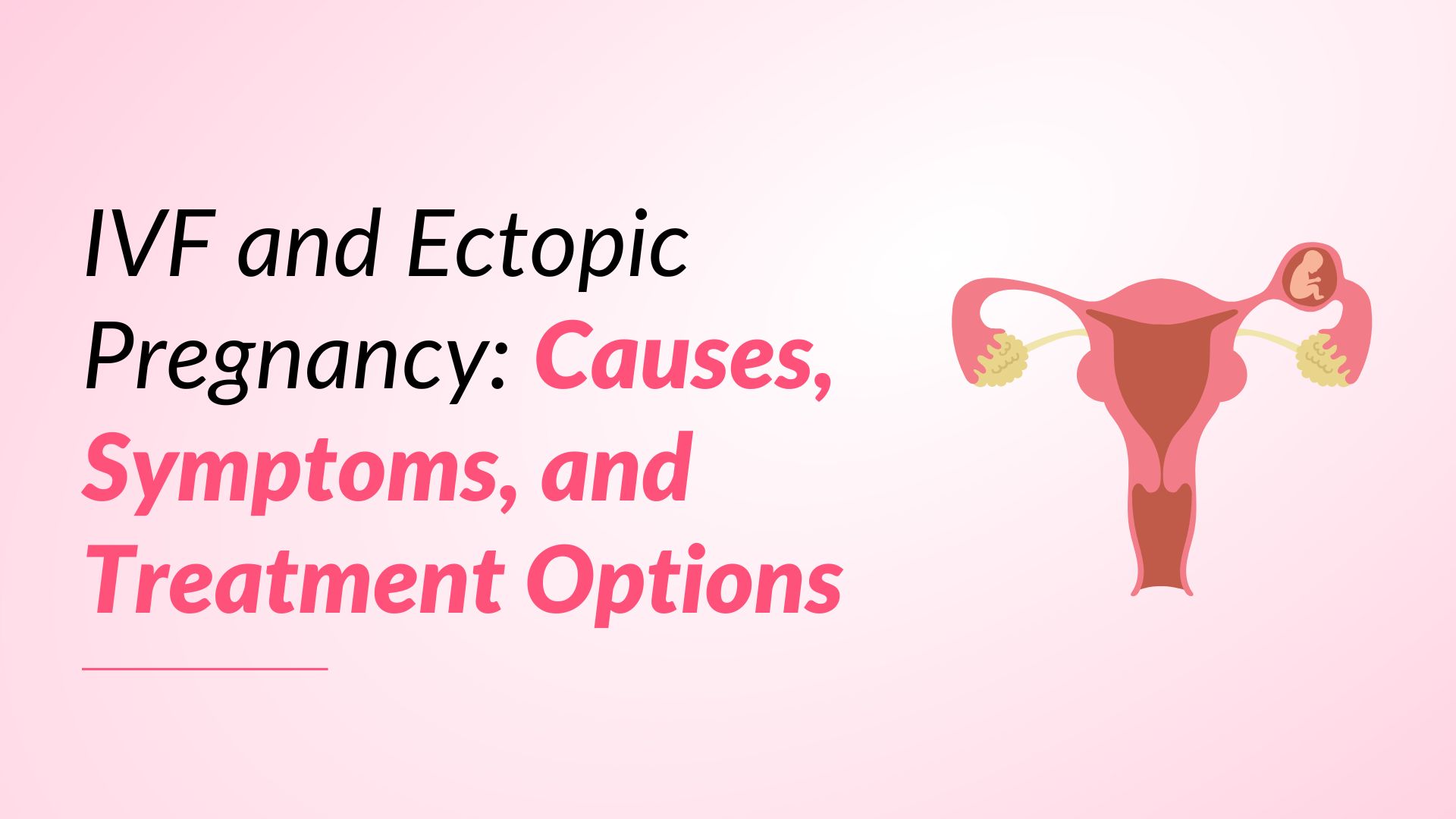IVF and Ectopic Pregnancy: Causes, Symptoms, and Treatment Options
Reviewed By: Dr. Prachee Kulkarni, fertility specialist at Ferty9 Fertility Clinic, Kukatpally, Hyderabad
Have you ever wondered why some pregnancies occur outside the uterus? This condition, known as an ectopic pregnancy, can pose serious health risks for women. For those undergoing IVF treatment, understanding this complication becomes even more crucial.
In India, the incidence of ectopic pregnancies ranges from 0.91% to 2.3%, with slightly higher rates observed in women using assisted reproductive techniques like IVF. However, advances in medical science and awareness about early signs have significantly improved outcomes.
This blog will break down what ectopic pregnancy means, its causes, symptoms, connection with IVF, and available treatment options, ensuring you are well-informed to face any challenges confidently.
What is Ectopic Pregnancy?
An ectopic pregnancy occurs when a fertilized egg implants outside the uterus, most commonly in the fallopian tube. Rarely, it can implant in the abdominal cavity, ovary, or cervix. Unlike normal pregnancies, an ectopic pregnancy cannot progress safely to term and requires medical attention to avoid complications.
The meaning of ectopic pregnancy lies in its deviation from the normal implantation process, making it a high-risk condition.
What Causes Ectopic Pregnancy?
The causes of ectopic pregnancy vary but generally relate to damage or abnormalities in the fallopian tubes. Factors include:
- Previous pelvic infections or pelvic inflammatory disease (PID): Causes scarring in fallopian tubes, blocking the egg.
- History of surgery in the pelvic region: Leads to scar tissue, obstructing the egg's passage.
- Previous ectopic pregnancy: Prior damage increases the risk of recurrence.
- Hormonal imbalances or structural abnormalities: Affects egg movement through the tubes.
- Endometriosis: Creates blockages in fallopian tubes.
Women undergoing IVF have a slightly increased chance of ectopic pregnancy, which will be discussed further.
IVF and Ectopic Pregnancy: What’s the Connection?
While IVF is designed to assist implantation directly into the uterus, the chances of ectopic pregnancy in IVF are still a possibility. Sometimes, the embryo may move to the fallopian tube after transfer, leading to an ectopic implantation.
Causes of ectopic pregnancy in IVF may include:
- Abnormal embryo migration
- Pre-existing damage to the fallopian tubes
- Uterine abnormalities that prevent proper implantation
Though the chances of ectopic pregnancy in IVF are slightly higher than in natural conception, regular monitoring helps detect complications earlier than in natural pregnancy.
Signs and Symptoms of Ectopic Pregnancy
Identifying the signs and symptoms of ectopic pregnancy is crucial for early treatment. Common symptoms include:
- Severe abdominal or pelvic pain: Intense pain that may be sharp or stabbing, often localized on one side.
- Vaginal bleeding or spotting: Unusual bleeding, which may be lighter or heavier than a normal period.
- Shoulder pain (caused by internal bleeding): Pain at the tip of the shoulder, indicating potential internal bleeding.
- Fainting or dizziness: Feelings of light-headedness or actual fainting due to internal blood loss.
Early Signs of Ectopic Pregnancy at 4-6 Weeks
In the early stages, the signs of ectopic pregnancy at 4 weeks can be subtle. These include mild cramping, light spotting, delayed periods, and a positive pregnancy test accompanied by low levels of the pregnancy hormone hCG. By 6 weeks, symptoms may become more pronounced, such as sharp pelvic pain and abnormal bleeding, which are classic ectopic pregnancy symptoms.
Diagnosis of Ectopic Pregnancy
Early diagnosis of ectopic pregnancy is vital to prevent complications. In IVF pregnancies, an early pelvic ultrasound 1 week after a positive pregnancy test is done for patients with high risk for ectopic pregnancy, which can detect a gestational sac outside the uterus. For naturally conceived pregnancies, doctors rely on a combination of tests to confirm the condition:
- Pelvic examination: A pelvic examination is performed to check for tenderness or a mass in the abdomen.
- Test for ectopic pregnancy: This includes blood tests to measure hCG levels, which tend to rise abnormally in ectopic cases.
- Ectopic pregnancy scan: A transvaginal ultrasound is the gold standard to locate the implantation site and confirm the diagnosis.
Treatment for Ectopic Pregnancy
The treatment for ectopic pregnancy depends on its stage and severity. Options include:
- Medication: In some cases, medication can be used to dissolve the abnormal pregnancy if diagnosed early. This medication, called methotrexate, is administered in the form of an injection. Most IVF-related ectopic pregnancies can be managed in this way due to early detection.
- Surgery: In cases where medication fails or complications arise, laparoscopic surgery is performed to remove the ectopic pregnancy.
- Expectant Management: Rarely, doctors may monitor the condition if it’s resolving naturally.
Understanding these treatments is essential for making timely decisions about your health.
Other types of ectopic pregnancies, such as cervical ectopic or cesarean scar ectopic need expert management depending on the situation.
Risks and Complications of Ectopic Pregnancy
Ectopic pregnancies can lead to several risks and complications if not treated promptly:
- Internal bleeding: Leading to shock and sometimes death due to severe blood loss, if untreated.
- Damage to fallopian tubes: Potentially affecting future fertility. But as already discussed, it is important to note ectopic pregnancy usually happens in an already damaged tube.
- Infection: Post-surgical infections can occur.
Suggested read: How Can Fallopian Tube Issues Lead to Ectopic pregnancy?
How Does IVF Impact Ectopic Pregnancy Treatment?
In cases of ectopic pregnancy in IVF patients, the approach to treatment may differ slightly. The doctor’s focus is not only on resolving the ectopic pregnancy but also on preserving reproductive health for future attempts. IVF after ectopic pregnancy is possible, but a detailed evaluation is necessary to ensure success.
Find Hope and Solutions for Female Infertility and Male Infertility — Explore Our Comprehensive Services
IUI Treatment
ICSI Treatment
PICSI Treatment
Fertility Preservation Service
Blastocyst Culture & Transfer Treatment
Genetic Screening & Testing
Conclusion
To recap, understanding what ectopic pregnancy means, its cause and its symptoms is crucial, especially for IVF patients. Early diagnosis and appropriate treatment for ectopic pregnancy can prevent complications and preserve fertility.
If you’re considering IVF or have concerns about ectopic pregnancies, Ferty9 Fertility Center is here to guide you with expertise and care. Book a consultation today to take the first step towards a safe and successful pregnancy journey.
Visit Our Clinic:
Fertility Clinic in Hyderabad
Fertility Clinic in Visakhapatnam
Fertility Clinic in Vijayawada
Fertility Clinic in Karimnagar
Fertility Clinic in Warangal
Fertility Clinic in Rajahmundry
Fertility Clinic in Tirupati
Fertility Clinic in Kurnool

Write your message


